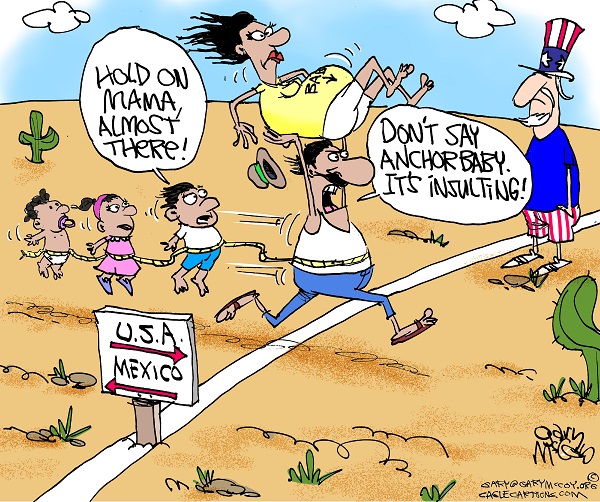

President Donald Trump threw another hand grenade into the illegal immigration debate when he proposed this week that he can end "birthright citizenship" with an executive order. It's not the first time Trump has weighed in on the anchor baby issue, having said in 2015 the practice needs be halted and that an act of Congress would accomplish it. Nor is Trump the only one who's ever proposed such a thing. Representative Steve King (R-Iowa) introduced legislation in the House to end the practice in 2011, 2013 and 2015. Former Democrat Senator Harry Reid (Corrupt–Nevada) introduced the Immigration Stabilization Act of 1993. History has shown that a feckless Congress beholden to its corporate and union masters has no interest in addressing immigration laws. Trump knows this. Conventional wisdom holds that the 14th Amendment grants citizenship on anchor babies based on its opening clause:
Mainstream legal scholars — also known as "constitutional scholars" in the mainstream propaganda media, implying that scholars who hold an opposing view are not "constitutional scholars" — hold that everyone born in the U.S. is "subject to the jurisdiction thereof," and are, therefore, citizens at birth. But that's not what the 14th Amendment's framers had in mind.
A little history. The 14th Amendment was proposed to combat laws called "Black Codes" that regulated behavior of newly freed black slaves following the War of Northern Aggression. The codes were first implemented by the Union Army occupying the former Confederate States. Both Southern and Northern states later took up Black Codes of their own. To establish and ensure that newly freed blacks had all the "privileges and immunities" of white citizens (i.e., that they could own property, conduct business, buy and lease land and move about freely in public places), Congress passed the Civil Rights Act of 1866. When he introduced the bill, Congressman James F. Wilson said it:
The opening clause of the Civil Rights Act of 1866 reads:
It's inconceivable that the same group of men that passed a law in Congress that excludes citizenship to people subject to a foreign power, and then overrode a presidential veto on that bill, would turn around and pass an amendment to ensure the act remained in force that granted citizenship status to people "subject to any foreign power." Congress suspected the Civil Rights Act could be overturned or rendered unconstitutional, so lawmakers drafted the 14th Amendment in order to prevent its repeal and to give it the support of constitutional footing. But the 14th Amendment was never lawfully ratified. The author of the 14th Amendment, Rep. John Bingham of Ohio, defended the introductory clause on House floor. He said:
Senator Jacob Howard, a backer of the amendment in the Senate, expressed the framers' intent:
This echoed the sentiments of the Founding Fathers who, though living in a new nation with a population consisting mostly of recent immigrants, recognized the danger of too many aliens arriving at once without the desire to assimilate into the "spirit" of the new country. "[Emigrants] will bring with them the principles of governments they leave, imbibed in their early youth;" Thomas Jefferson wrote in his "Notes on the State of Virginia," "or, if able to throw off, it will be in exchange for unbounded licentiousness, passing, as is usual, from one extreme to the other. It would be a miracle if they were to stop precisely at the point of temperate liberty." And writing "an Examination of the President's Message" in 1802 for the New York Evening Post, Alexander Hamilton posited that, "Some reasonable term ought to be allowed to enable aliens to get rid of foreign and acquire American attachments; to learn the principles and imbibe the spirit of our government; and to admit of a probability at least, of their feeling a real interest in our affairs." I strongly oppose rule by executive order, which is an unconstitutional power grab over congress and running precedent for an imperial presidency. But this seems more an effort at nullifying unconstitutional edicts of the federal courts than a power grab. After John Adams signed legislation that made it a treasonable activity to publish "any false, scandalous and malicious writing" which became the Alien and Sedition Acts, Jefferson and James Madison drafted Kentucky Resolutions and Resolutions for Virginia that essentially said that when the Federal government assumes undelegated powers — those not enumerated in the Constitution — those acts are "unauthoritative, void, and of no force." These came to be known as the Principals of '98. Alexander Hamilton posited the same idea in Federalist #78, writing:
That thought is also codified in U.S. law:
If Trump does sign an executive order to end the practice of anchor baby citizenship, his goal may be to get the issue before the Supreme Court so it can become "settle law." At least that seems to be the case given one of his latest tweets on the subject. The Supreme Court has never ruled on a case specifically dealing with the birthright citizenship issue, despite what the mainstream pundits and leftist echo chamber have claimed. |

